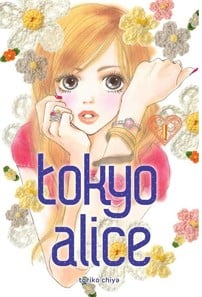Review
by Rebecca Silverman,Tokyo Alice
GN 1
| Synopsis: |  |
||
Fu Arisugawa is a little worried there might be something wrong with her. She loves shopping above all else, using her money to buy designer and brand-name items to the exclusion of all else. But while her friends also enjoy shopping, they're all also on the hunt for love in one way or another – something that Fu finds she just isn't all that interested in. When her boss starts showing interest in her, will Fu figure it out? Or is she going to keep going in her shopping wonderland? |
|||
| Review: | |||
At first blush, Tokyo Alice looks like a manga version of the stereotype that women just love to shop more than anything else in the world. And that is part of what's going on here – Fu Arisugawa is a shopaholic, specifically addicted to brand names and expensive fashions. She's lusting after a specific Chanel bag and has been saving up for it, but it's slow going because she just can't resist a sale. It really is her favorite thing to do, and while that won't sit well with some readers, there's more to Fu than just her love of spending money. Specifically, she believes that she has to choose: fashion/shopping or love. This means that her fondness for shopping is more of a stand-in for anything that someone feels they have to choose between alongside of love. In the past, that would be a career, like women who never married so that they could continue being schoolteachers. Today it could be anything, and for Fu that's how she reconciles her hobby with her disinterest in men. In the volume's opening pages she directly relates herself to Lewis Carroll's Alice, with the implication that she's choosing between two Wonderlands, but we could also, given her actions throughout the e-book, read it as Alice choosing between following the White Rabbit and staying by her sister's side, i.e. the choice between what you want to do and what you ought to do. To a degree, this is borne out by Fu's friends. One is a loser magnet, one is looking for a fling while she awaits her arranged marriage, and one is in love with another woman but afraid to say anything. All three of them, in other words, are actively in love or looking for it, and that makes Fu feel like maybe she's behind the curve. But the fact of the matter is that she simply doesn't seem to be interested in romance, although I highly doubt she'll turn out to be asexual or aromantic. This makes her the queen of missing signals, or at least at pretending to miss them, which leads to the interpersonal tension in the volume. Fu's boss, Okuzono, is fast developing an interest in her, and while he's not shy about admitting it, she's simply not there for any of it. It's not entirely clear whether Fu really is missing signals or if she's simply being obtuse. Their relationship seems to begin when Fu is stranded at the train station after the last train and spots Okuzono. She invites herself to stay at his house rather than having to sleep at the train station (she's broke at the time), and while she thinks she's being pushy, she doesn't seem to realize that Okuzono might think she's propositioning him. Things go from “maybe” to “ripe for misunderstanding” when she builds him an elaborate Valentine's chocolate to thank him for putting her up. She's made them for a few people, but Okuzono takes it to be affection chocolate (and he flat-out tells her so), and since Fu's denials are easy to ignore since she's basically just lightly brushing him off, it's clear that Okuzono thinks that she really does like him romantically. Things really come to a head at the finale of the volume, with Fu doing something that Okuzono really can't interpret as flirting, and it sets things up for a tense beginning to volume two. This is hardly Chiya's first foray into awkward office romances (her 1997 series Clover ran for twenty-four volumes), and it does show – there's a believable stiltedness to the Okuzono/Fu interactions even though he's not a great emoter, and the way that Fu is shown to be very good at her job and is able to keep her work and private lives separate makes things feel a bit more relatable than similarly set stories. Fu's assortment of friends are fairly recognizable as well, as are their personal motivations even if you don't agree with them, and while there's definitely the fantasy aspect of the romance genre present in the story, it still feels grounded in a recognizable reality. Chiya's art isn't terrific, but it is good at getting the job done. Faces are perhaps the biggest issue, and if you remember Erica Sakurazawa's work when it was released by Tokyopop in the early 2000s you may see a general similarity. It's a very familiar art style to readers of josei manga, and Chiya uses it well, with good backgrounds and a basic attention to body language and personal details. I suspect from my volumes of Clover that this would look better in a print version, but the digital edition isn't really a problem art-wise. Tokyo Alice is an interesting story that seems set to explore what we want versus what we think we ought to do. Whether or not Fu ends up with Okuzono or not is almost secondary to Fu figuring herself out, and unless this takes a major left turn later on, this is looking like a nice addition to the category of English-language manga for adult women. |
| Grade: | |||
|
Overall : B
Story : B+
Art : B-
+ Fu's worries are relatable, the story is engrossingly grounded |
|||
| Production Info: | ||
|
Full encyclopedia details about Release information about |
||